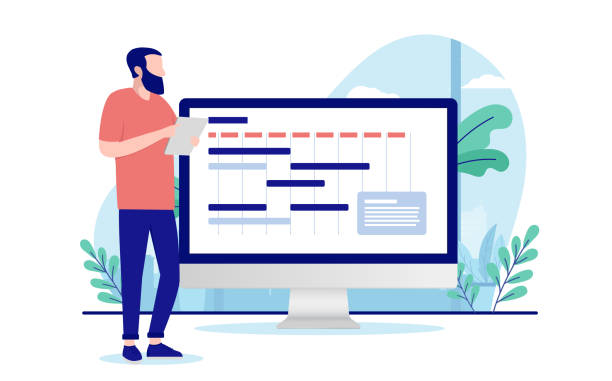An Introduction to the Importance of E-commerce Website Design in the Digital Age
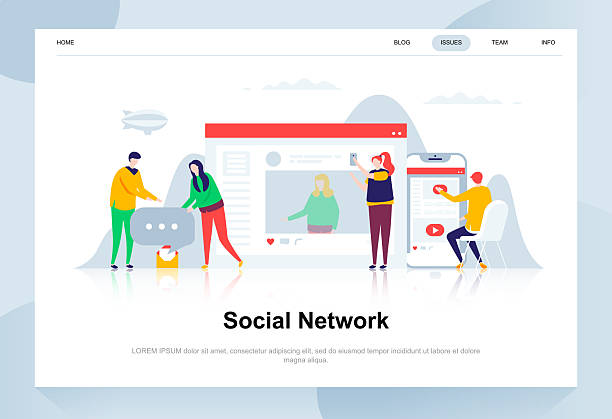
In today’s world, where the pace of technological change is high and a significant part of daily life is intertwined with the internet, having a strong online presence is vital for any business.
E-commerce
is no longer a luxury option but has become a necessity.
#online_businesses #online_store and e-commerce websites are powerful tools to reach more customers beyond geographical boundaries.
The importance of e-commerce website design goes beyond merely displaying products; it is a strategic investment for the growth and survival of a business in a competitive market.
An efficient online store allows you to showcase your products 24/7, simplify the purchasing process for customers, and collect valuable data about their behavior.
This explanatory and educational approach shows you how to make the best use of these opportunities.
With professional e-commerce website design, businesses can reduce their operational costs, access new markets, and establish a more direct connection with their customers.
Furthermore, the ability to personalize the shopping experience, offer targeted discounts, and analyze sales performance accurately are significant advantages of having an online presence.
This becomes even more crucial, especially as consumers increasingly prefer online shopping.
Consequently, a deep understanding of the e-commerce website design process and its components is the first step towards success in this field.
Therefore, this article helps you become familiar with various aspects of creating a robust online store and understand how an e-commerce website can fulfill your business objectives.
Are you tired of losing business opportunities due to not having a professional corporate website?
Rasawab helps you with professional corporate website design to:
✅ Build a powerful and reliable brand image
✅ Convert website visitors into loyal customers
⚡ Get a free consultation now!
Key Features of a Successful and User-Friendly E-commerce Website
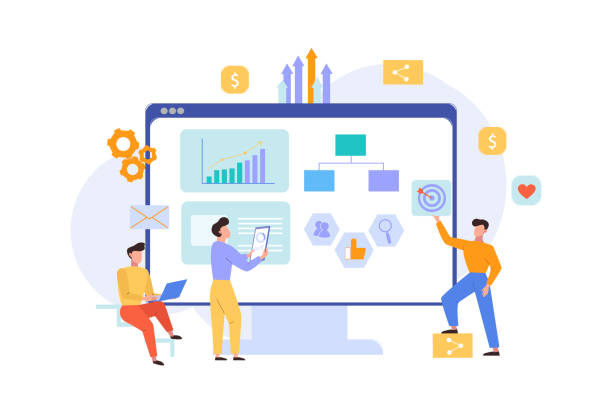
After understanding the importance of an online presence, the main question is: what features make an e-commerce website successful and user-friendly? A successful e-commerce website design is not limited to aesthetic appeal; it must also pay special attention to functional aspects and user experience.
Among the most important features is responsive design, which ensures your website displays correctly on any device, from mobile to desktop.
Advanced search capabilities and precise product filtering, easy navigation, and clear categories are essential for customers to quickly find desired products.
Furthermore, clear and attractive product display with high-quality images and complete descriptions plays a significant role in the buyer’s decision-making.
The presence of user reviews and ratings for products builds trust among buyers and acts as a form of social marketing.
A simple and secure payment process, a shopping cart with saving capability, and order tracking are other key features.
Strong customer support via online chat, phone, or email is also crucial for resolving issues and answering buyer questions.
This guided and specialized section helps you prepare a list of the most essential features for your e-commerce website design and ensure that your website is not only beautiful but also fully functional and effective.
Considering these features from the beginning of the e-commerce website design process will pave your path to success.
Choosing the Right Platform for E-commerce Website Design
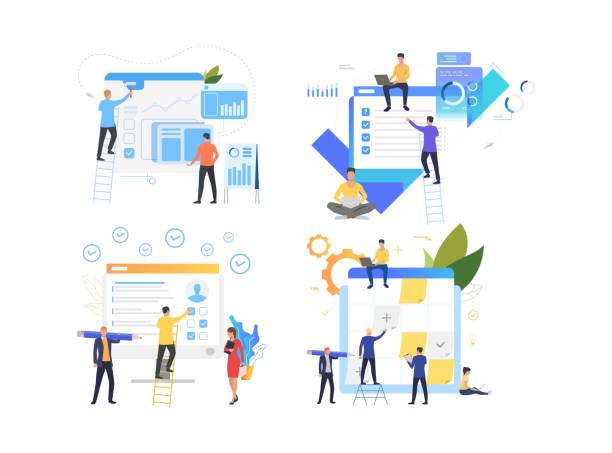
One of the fundamental decisions in the e-commerce website design process is choosing the right platform.
This choice will deeply impact the future capabilities, costs, ease of management, and scalability of your online store.
Various platforms exist in the market, each with its unique advantages and disadvantages.
Among the most popular options are WooCommerce, which is a powerful plugin for WordPress; Shopify, which is a SaaS (Software as a Service) solution; and Magento for larger businesses.
This analytical and specialized section helps you make the best choice for your specific business needs by providing a deep understanding of the differences between these platforms.
| Platform | Advantages | Disadvantages | Suitable for |
|---|---|---|---|
| WooCommerce | High flexibility, full control, large user community, thousands of plugins | Requires technical knowledge, server management, additional costs for hosting and plugins | Small to medium businesses requiring customization |
| Shopify | Ease of use, strong support, managed hosting and security | Less control over code, fixed monthly costs, limitations in deep customization | Small to medium businesses without technical knowledge |
| Magento | High scalability, advanced features, immense flexibility | High complexity, requires specialized developers, high costs | Large businesses and enterprise companies |
| Custom Code Solutions | 100% customization, optimal performance, high security | Very high initial cost, long development time, dependence on developer | Businesses with very specific needs and high budgets |
Platform selection should be based on your budget, business size, existing technical knowledge, and future needs.
For example, if you are looking for a quick and hassle-free solution, Shopify is a good option.
However, if you want full control over your website’s code and functionality and require deep customizations, WooCommerce or even e-commerce website design with custom coding might be suitable.
It is crucial to have a precise assessment of your needs before making any decision.
User Experience (UX) and User Interface (UI) in Online Store Design
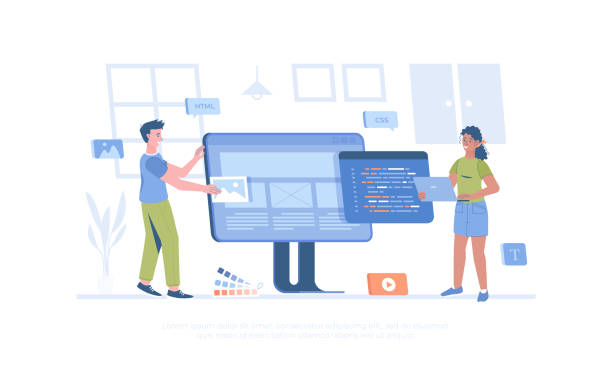
User Experience (UX) and User Interface (UI) are two main pillars in e-commerce website design that directly impact your success and sales.
User Interface refers to the appearance and layout of visual elements on a website, while User Experience relates to how users feel and react when using the website.
An attractive UI design can draw customers to your website, but poor UX can quickly drive them away.
The ultimate goal in e-commerce website design is to create an easy, enjoyable, and hassle-free shopping experience for the customer.
To achieve this, special attention must be paid to factors such as intuitive and simple navigation, fast page loading times, an easy step-by-step payment process, and mobile compatibility.
Cluttered and complex layouts, too much information on one page, or unclear Call-to-Action buttons can confuse the user and lead to an unpleasant experience.
The educational and guidance content in this section emphasizes that every part of your online store design should be carried out with the end-user in mind.
From colors and fonts to the placement of buttons and forms, everything should be designed so that the user can easily achieve their goal, which is to purchase a product.
The importance of user testing and collecting feedback is also immense in this regard, allowing you to continuously improve the user experience.
Did you know that poor online store design can drive away up to 70% of your potential customers? Rasawab revolutionizes your sales with professional and user-friendly e-commerce website designs.
✅ Significant increase in sales and revenue
✅ Full optimization for search engines and mobile
⚡ [Get a free consultation from Rasawab]
Secure Payment Gateways and the Importance of Security in E-commerce Websites
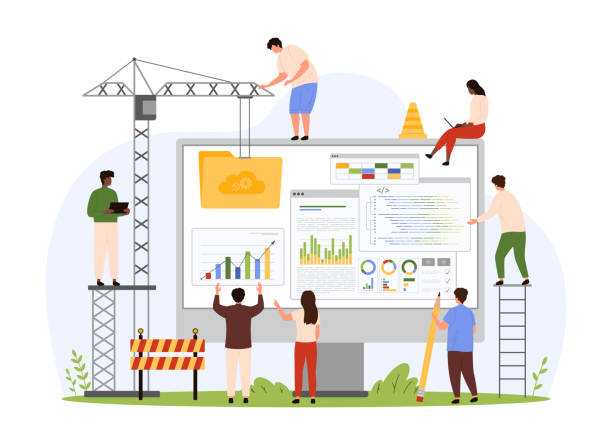
Security is one of the most significant concerns for customers when shopping online.
E-commerce website design without attention to security is a major risk that can lead to loss of customer trust and even financial damage.
Choosing secure and reliable payment gateways is the first step in ensuring transaction security.
Payment gateways must have valid security certificates like SSL/TLS, which encrypt information exchanged between the user and the server.
This specialized and explanatory approach helps you become familiar with the key aspects of security in e-commerce website design.
In addition to payment gateways, overall website security must also be ensured.
This includes regular updates to the platform and plugins, using strong passwords, protecting against cyberattacks such as SQL injection and XSS, and regular data backups.
Displaying electronic trust symbols and logos of reputable payment gateways also helps increase user trust.
Have you ever considered the irreparable consequences a security breach could have for your business? This thought-provoking content emphasizes the importance of prevention.
An online store design that does not prioritize security is doomed to fail.
Ensuring that customer data, especially their financial information, is processed and stored in a secure environment is not only a technical requirement but also an ethical responsibility.
Search Engine Optimization (SEO) to Increase Online Store Traffic
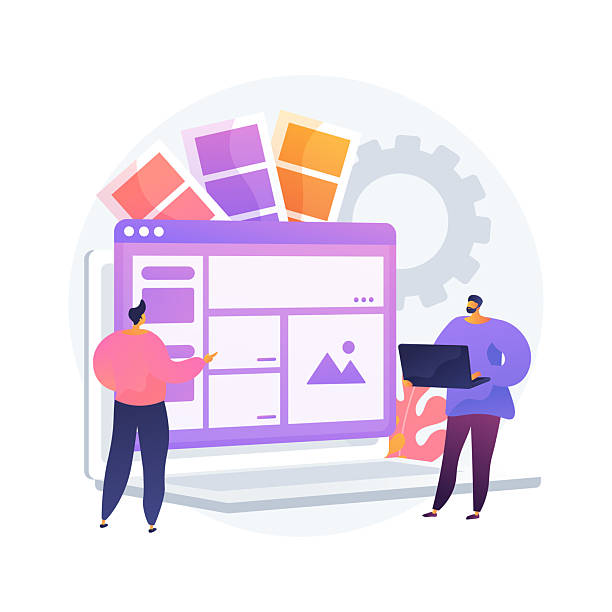
Building an excellent e-commerce website is only half the battle; the other half is ensuring it gets seen.
Search Engine Optimization (SEO) is a specialized and ongoing process that helps your website rank higher in Google and other search engine results and attract more visitors.
This guiding and specialized section shows you how to drive organic traffic to your online store using SEO strategies.
Numerous factors are effective in SEO for e-commerce website design, including researching keywords relevant to your products, optimizing titles and meta descriptions for each product page, using search-engine-friendly URLs, and improving page loading speed.
Creating high-quality and unique content for product pages and blogs, building appropriate internal links, and acquiring backlinks from reputable websites are also of high importance.
Additionally, technical SEO involves optimizing site structure, using an XML sitemap and robots.txt file, and ensuring proper crawlability and indexability of your website by search engines.
An e-commerce website design without a strong SEO strategy is like a beautiful store in the middle of a desert; no one will find it.
Investing in SEO ensures that your efforts for e-commerce website design bear fruit and lead to increased sales and profitability.
Digital Marketing Strategies for Promoting an E-commerce Website
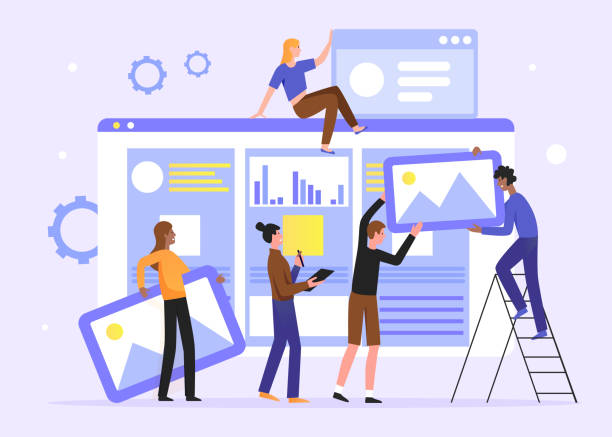
After designing your e-commerce website and optimizing it for search engines, the next step is to promote and market it.
Digital marketing encompasses a set of strategies and tactics that help you introduce your e-commerce website to your target audience and convert them into loyal customers.
This analytical and news-oriented section familiarizes you with the latest and most effective digital marketing methods for an e-commerce website.
| Marketing Channel | Main Goal | Advantages | Key Points |
|---|---|---|---|
| Content Marketing | Attract organic traffic, build credibility | Cost-effective in the long run, builds trust | Produce high-quality and relevant content (blog, video) |
| Social Media Marketing | Increase brand awareness, customer engagement | Access to broad audiences, quick feedback | Choose the right platform, engaging visual content |
| Email Marketing | Customer retention, campaign notification | High ROI, personalized communication | Build email list, personalize messages |
| Paid Advertising (PPC) | Generate immediate leads, increase sales | Fast results, precise budget control | Keyword research, landing page optimization |
| SEO | Increase long-term organic traffic | Stability of results, reduced advertising costs | Technical and content optimization of the website |
Utilizing digital marketing includes targeted email campaigns, activity on social networks relevant to your audience, and running paid advertising campaigns (PPC) on Google and social media.
Additionally, collaborating with influencers, affiliate marketing, and creating engaging and entertaining content such as product videos or buying guides can help attract new customers.
Analyzing data and campaign performance for continuous optimization is also of high importance.
A comprehensive marketing strategy complements your e-commerce website design and ensures that the full potential of your online store is utilized.
Maintenance, Support, and Continuous Updates for E-commerce Websites

Launching an e-commerce website is just the beginning.
To ensure smooth operation, stable security, and optimal efficiency, continuous maintenance, support, and updates are of vital importance.
This guiding and specialized section explains why you should not overlook these aspects throughout the lifespan of your e-commerce site.
Without regular maintenance, even the best e-commerce website design can face security issues, reduced speed, and technical incompatibilities.
Some key maintenance actions include regularly checking website performance, regularly backing up all data, updating the Content Management System (CMS) and all plugins and themes, and monitoring security to identify and fix vulnerabilities.
Additionally, monitoring broken links, optimizing the database, and ensuring the correct functioning of all forms and payment gateways are essential.
Fast and efficient technical support assures you that in case of any problem, you can quickly resolve it.
Do not forget that your competitors are always improving; therefore, your e-commerce website design must also constantly evolve to maintain its competitiveness and provide an up-to-date user experience.
This proactive approach prevents serious problems and ensures the longevity and success of your online store.
Did you know that poor online store design can drive away up to 70% of your potential customers? Rasawab revolutionizes your sales with professional and user-friendly e-commerce website designs.
✅ Significant increase in sales and revenue
✅ Full optimization for search engines and mobile
⚡ [Get a free consultation from Rasawab]
Exploring Future Challenges and Trends in Online Store Design and Management

The world of e-commerce is rapidly changing and comes with new challenges and opportunities.
Understanding future trends and potential challenges in e-commerce website design and its management helps businesses prepare for the future and maintain their competitive advantage.
This analytical and thought-provoking section examines topics that may soon revolutionize the way e-commerce websites are designed and how customers interact.
Important future trends include wider use of Artificial Intelligence (AI) for personalizing the shopping experience, Augmented Reality (AR) and Virtual Reality (VR) for more realistic product display, and increased focus on sustainability and corporate social responsibility.
Challenges such as data privacy, increased competition, and the need to provide Omnichannel shopping experiences, which blend online and offline channels, are also gaining importance.
Will your e-commerce website design be ready to respond to these changes? Preparedness for these developments means investing in new technologies, flexibility in strategies, and focusing on changing customer needs.
Creating an online store capable of adapting to emerging technologies and responding to new customer expectations will be the key to long-term sustainable success.
Conclusion and Next Steps for Launching a Successful E-commerce Business

Throughout this article, we have comprehensively examined various aspects of e-commerce website design, from its fundamental importance in the digital age to platform selection, the significance of UX/UI, security, SEO, and marketing strategies.
We also touched upon continuous maintenance and updates, and looked at future challenges and trends.
This concluding and guiding section provides a summary of key points and outlines the next steps for launching a successful e-commerce business.
E-commerce website design is not just about building a website; it’s about creating a complete ecosystem for your business in the online space.
This process requires meticulous planning, strategic choices, and attention to detail.
Your next steps should include thorough research into your target market and competitors, planning for budget and resources, choosing a reputable e-commerce website design partner, and finally, continuously implementing marketing and optimization strategies.
Remember that success in e-commerce is a continuous journey, requiring ongoing learning and adaptation to market and technology changes.
By following this comprehensive guide and investing in professional e-commerce website design, you can establish a powerful online presence and elevate your business to new levels of growth and success.
Frequently Asked Questions
| Question | Answer |
|---|---|
| What is e-commerce website design? | It is the process of creating an online platform for selling products or services, which includes User Interface (UI) design, User Experience (UX), and the necessary functionalities for online purchasing. |
| What are the key features of a good e-commerce website? | Easy navigation, high loading speed, strong search capability, efficient shopping cart, secure payment gateway, clear product display with high-quality images, ability to show user reviews, and responsiveness (mobile compatibility). |
| What platforms are common for e-commerce website design? | Popular platforms include WooCommerce (on WordPress), Shopify, Magento, PrestaShop, and also custom Content Management Systems. |
| What is the importance of an e-commerce website being responsive? | Given the increased use of mobile for online shopping, a responsive website (correct display on different screen sizes) is crucial for providing a good user experience and increasing conversion rates. |
| How long does the process of designing an e-commerce website usually take? | The duration depends on the project’s complexity, the number of products, special features required, and the implementation method, and can vary from a few weeks to several months. |
And other services of Rasawab Advertising Agency in the field of advertising:
Smart Content Strategy: A combination of creativity and technology for campaign management using real data.
Smart Digital Advertising: A creative platform for improving digital branding with precise audience targeting.
Smart Marketplace: A professional solution for improving SEO ranking with a focus on customizing user experience.
Smart Advertising Campaign: An effective tool for attracting customers with the help of SEO-centric content strategy.
Smart Digital Branding: Designed for businesses looking to attract customers through marketing automation.
And over hundreds of other services in the field of internet advertising, advertising consultation, and organizational solutions.
Internet Advertising | Advertising Strategy | Advertorial
Resources
E-commerce Website Design
Important Tips for Successful Online Store Design
Professional Website Design
Starting an Online Store
? Ready to revolutionize your business in the digital world? Rasawab Afarin Digital Marketing Agency, with expertise in comprehensive services including custom website design, professional SEO, and targeted advertising campaigns, is your guide to success in the online space. With us, your brand will shine at its peak.
📍 Tehran, Mirdamad Street, next to Bank Markazi, Kazeroun Jonoubi Alley, Ramin Alley No. 6

